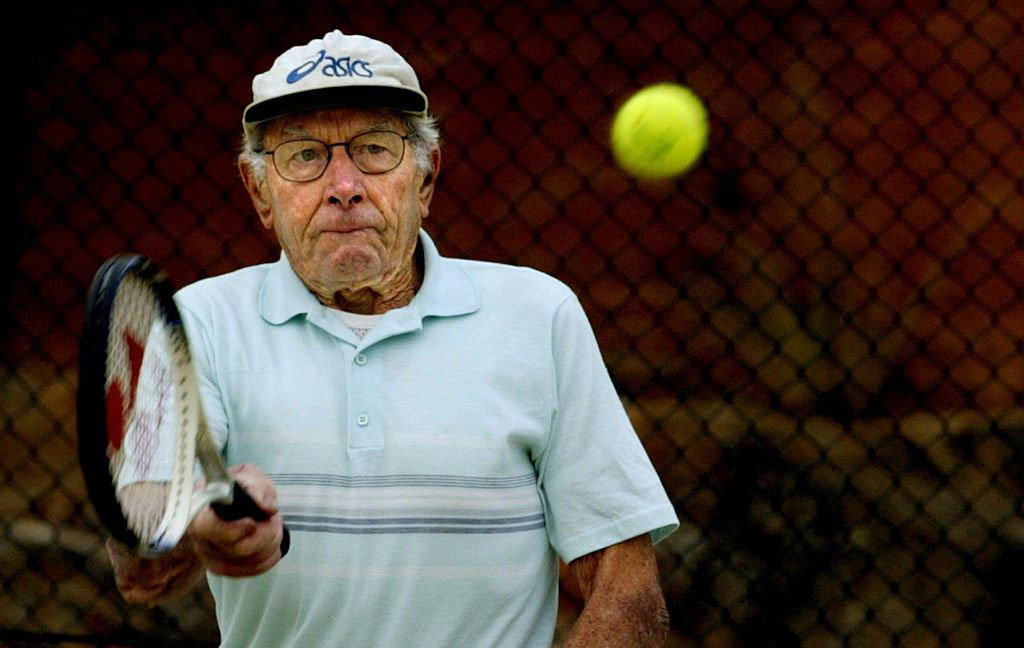Benefits of Tennis for Seniors

Playing tennis isn’t just for the young. It can also keep your mind and body healthy as you age.
The aging process is often associated with what the medical community calls functional decline. This includes a decreased lung capacity, weakened heart, increased likelihood of hypertension, loss of strength and muscle mass, increase in body fat, low bone density, and cognitive decline. All these factors can contribute to poor health and both mental and physical frailty in seniors.
But these symptoms, research suggests, are not directly a result of aging. Instead, they are a consequence of inactivity. Yes, your body changes as you grow older. But staying fit and active can help prevent dangerous declines, such as heart disease, bone fractures, and memory loss.
If you want to stay both physically and socially active, you might want to think about taking up tennis.
YOU MIGHT ALSO LIKE: Protecting Your Mobility in Old Age
Strength and weight
The health benefits of tennis for seniors include upper and lower body strength, as well as helping maintain a healthy weight. Tennis players are also likely to have a low percentage of body fat and a body mass index within the healthy range.
One study of tennis players between the ages of 31 and 55 found that both men and women consistently had below average body fat. Low body fat can help reduce your risk for diabetes, high blood pressure, heart attack, and other chronic diseases often associated with aging, as well as keeping your joints healthy and mobile.
Heart and lung health
Vigorous physical activity such as tennis promotes a healthy heart and lungs as you age. Studies have found that tennis players have above-average aerobic capacity, or oxygen intake, indicating a high level of both heart and lung health. Tennis is also one of many forms of exercise that can lower your risk for cardiovascular disease and help maintain healthy blood pressure.
Research has shown that tennis players also have a higher average heart volume than non-active people, allowing their bodies to pump blood more efficiently as they exercise. Another study found that male tennis players between the ages of 40 and 59 had higher levels of HDL (or good) cholesterol than their less-active peers.
YOU MIGHT ALSO LIKE: A Daily Routine Is Important for Seniors
Bone health, osteoporosis, and falling
Weight bearing exercise like tennis helps to increase bone density, which prevents osteoporosis and bone fractures. One large study of women ages 65 and older found that vigorously active women were 33 percent less likely to suffer from fractures than inactive women. A study of men over the age of 44 found similar results.
Because tennis involves quick movement and direction changes, it also helps maintain your balance, coordination, and muscle agility, three factors that can help prevent falls. Falling, reports the National Council on Aging, is the leading cause of fatal and non-fatal injuries for older men and women, including breaks and fractures. A serious enough fall can lead to time in the hospital and even a loss of mobility.
The health benefits of exercise like playing tennis, by contrast, will keep seniors agile and strong, preventing falls and helping you remain independent as you age.
Memory and mental health
Research strongly indicates that exercise can help maintain cognitive function as you age, preventing memory loss and keeping your mind sharp. In a study following 299 adults over 9 years, researchers found that exercise was linked to higher amounts of grey matter in the brain, which is associated with a lowered risk of cognitive impairment.
Structured, intense exercise in particular, such as playing a tennis match, has been shown to improve mental performance and help lower your risk for Alzheimer’s disease and other forms of dementia.
Safety tips for playing tennis as you age
Of course, tennis is a strenuous activity, and you may find that you are not able to push yourself while playing to quite the same extent as a younger player would.
One study of male tennis players between the ages of 39 and 61 found that even those with normal resting blood pressure were susceptible to increases while playing. It’s important, therefore, to pay attention to your heart rate as you play and take a break if you start to feel out of breath, dizzy, or fatigued.
Older players can also be more prone to dehydration and electrolyte loss while exercising. Be sure to drink plenty of water, eat drink or eat food high in electrolytes after playing, and pay attention to temperature so you don’t become overheated.
As with all forms of exercise, it’s important to be aware of your body’s particular needs. If you are unsure whether tennis or any other physical activity is right for you, talk to your doctor about how to exercise safely.
Updated:
April 07, 2020
Reviewed By:
Janet O’Dell, RN